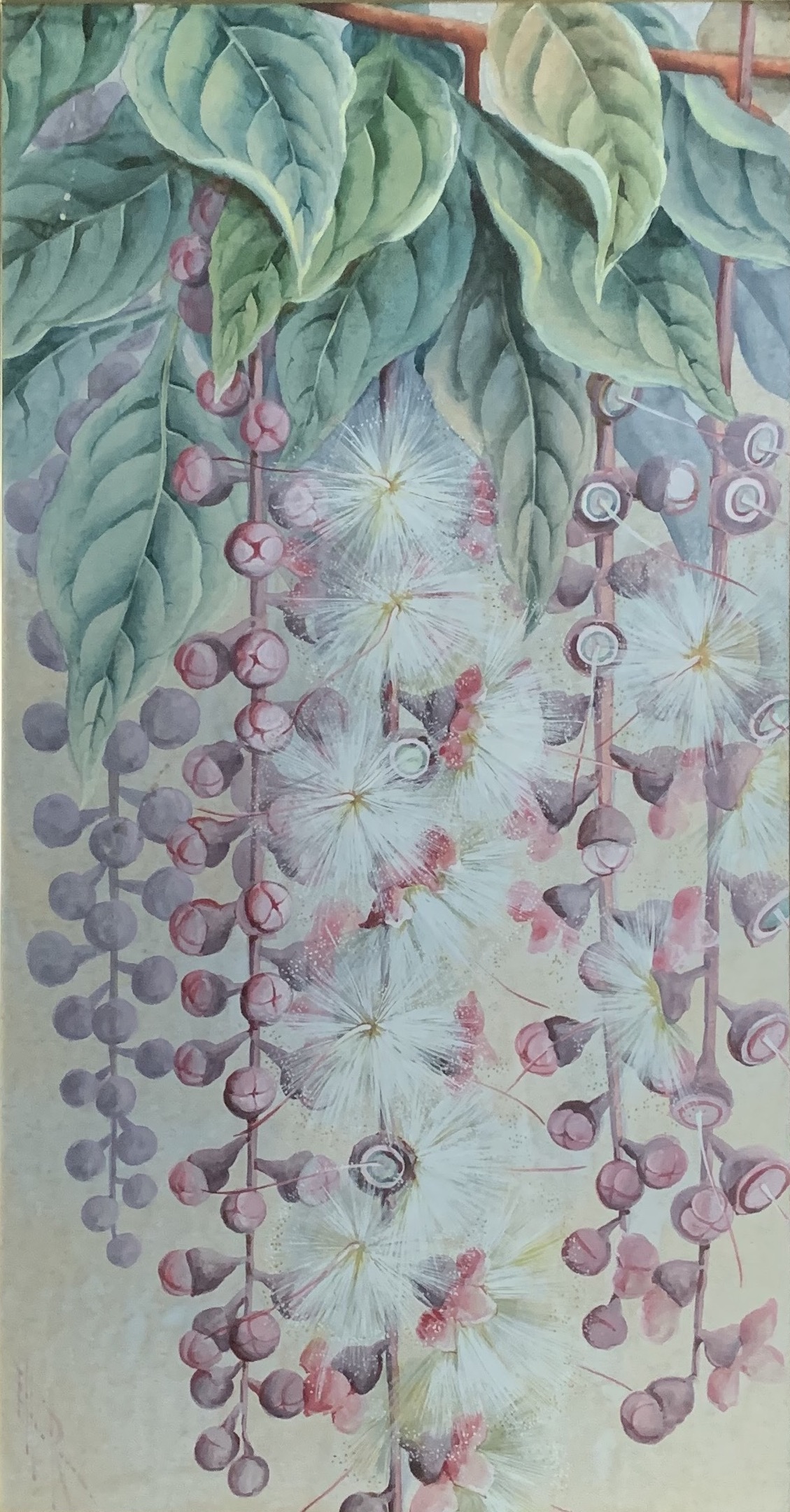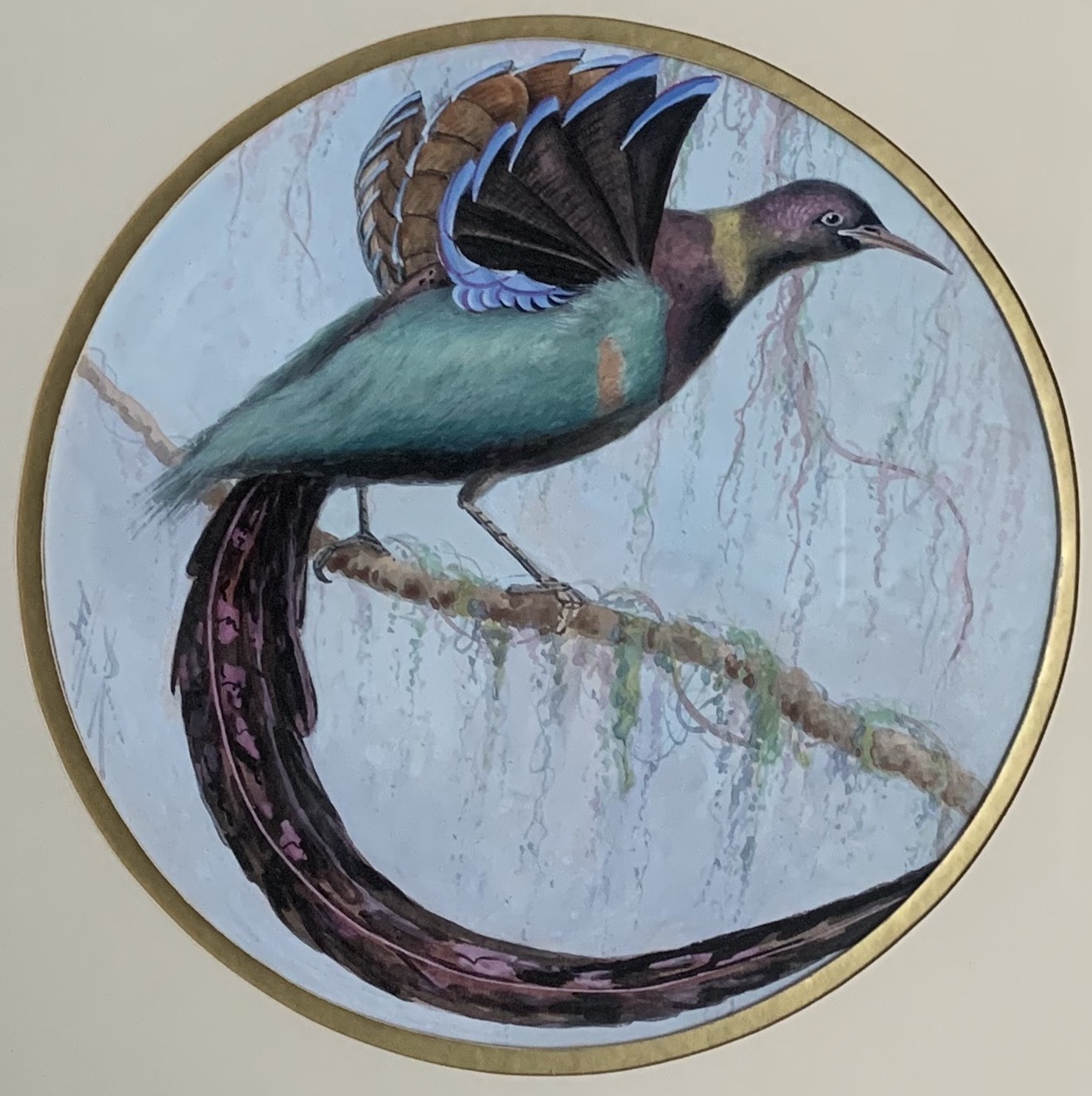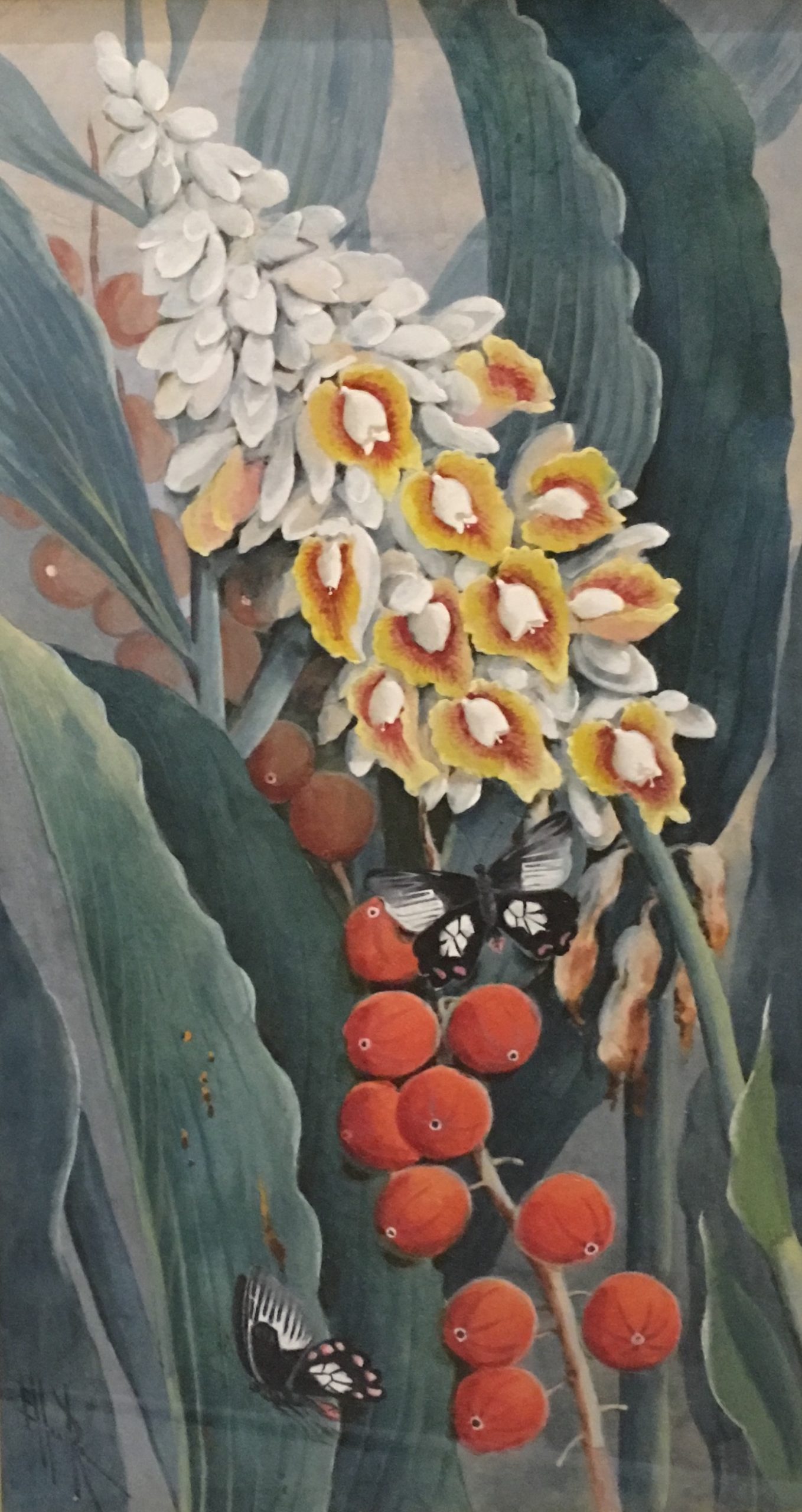Marian Ellis Rowan
1848 - 1922
Biography
Marian Ellis Rowan (1848 - 1922) was a remarkable woman, inspired by the flora and fauna of the world to create her elegant artworks. She blurred the lines between fine art and natural history illustration with artworks characterised not only by their detailed accuracy but also her own compositional charm and touches of dramatic interest, such as the inclusion of insects. Earlier examples were often painted on coloured paper with the flowers arranged like a posy, usually in the middle of the picture, whilst later works incorporated more narrative elements, citing the plant in a setting, perhaps cloudy skies or drizzling rain or sometimes even a background landscape. This extends to her imagery of birds where they are carefully positioned amongst branches and foliage. The later works tend to fill the paper – sometimes with hanging or drooping leaves, or growing and reaching up, showing a greater compositional concern rather than botanical identification. There is also her tendency to sprinkle descriptive touches such as butterflies, caterpillars, beetles and other bugs, adding more life, colour, movement and giving a sense of scale.
Although Ellis Rowan is known for her extensive and adventurous global travel, she was particularly inspired by the gardens of her youth at Mount Macedon when her father acquired Derriweit Heights in 1872 : 26 acres with garden layout designed by W. R. Guilfoyle and government botanist Ferdinand Mueller advised on plantings. As Director of the Royal Botanic Gardens in Melbourne, von Mueller encouraged Ellis Rowan to submit her artworks for identification, recording many exotic species. He also provided her with useful contacts, particularly internationally.
Her husband, Captain Frederic Charles Rowan also encouraged her artistic career, following their marriage in 1873 and his travels allowed her to accompany him and continue her pursuit of depicting wildflowers. After his premature death in 1892, Ellis Rowan was able to renew her travels with a greater freedom, spending time in New Zealand; London; New York; California; Cuba; the Caribbean; Papua New Guinea; Queensland; Kalgoorlie; Broken Hill; the Grampians.
The delicacy of her paintings and fragility of her materials, predominately watercolour and gouache on paper, belie the challenging conditions she travelled to capture her subject, usually painted in situ and from life – including the rainforests of Queensland; wildflowers in remote Western Australia; tropical Papua New Guinea; mountains of New Zealand; the foothills of the Himalayas; a decade long trip to England where her work was collected by Queen Victoria; and America where she collaborated on texts which became standards for botany students (A Guide to the Wildflowers 1899; A Guide to the Trees, 1900; Southern Wildflowers and Trees, 1901).
This celebrated and prolific artist with her reputation for painting wildflowers is represented in many public collections including significant holdings at the National Library of Australia and the Queensland Museum; as well as the National Gallery of Australia; the National Gallery of Victoria; the Art Gallery of New South Wales; Queensland Art Gallery/Gallery of Modern Art; the Art Gallery of Western Australia; the Royal Botanic Gardens, Adelaide; the National Herbarium, Melbourne; the National Trust of Australia; the Museum of Applied Arts and Sciences.
Check the stockroom for artworks by Marian Ellis Rowan
Exhibitions
Achievements, Collections & Commissions
Edited chronology based on Patricia Fullerton’s The Flower Hunter, NLA 2002 (pp. 22-25)
1869 Travel to England and possible study through connections of her uncle, the Royal Academician Sir Charles Eastlake
1872 Awarded Bronze Medal at Intercolonial Exhibition, Melbourne (four panels of Australian wildflowers)
Family acquire property at Mount Macedon
1873 Marries Captain Frederic Charles Rowan and move to New Zealand
1875 Return to Macedon for birth of her son before returning to New Zealand
1877 Move to Melbourne
1879 Awarded Silver Medal at International and Intercolonial Exhibition, Sydney
1880 Awarded Gold Medal at opening of the Exhibition Buildings, Melbourne
1887 Visits Queensland and series of etchings included in Australasia Illustrated
1888 Awarded Gold Medal and First Order of Merit and second prize, Centennial International Exhibition, Melbourne
Awarded Gold Medal and 5 first awards, Adelaide Jubilee Exhibition
1892 Visits Queensland; husband dies
1893 Awarded Gold Medal World Columbian Exhibition, Chicago; Visits New Zealand; commission for The Australian Club (other commissions of the early 1890s include for the dining Room at the Victoria Racing Club and murals for Janet Clarke at Clivedon); holds first commercial solo exhibition
1895 Visits London, including acquisition by Queen Victoria
1896 Exhibits in London
1897 son dies; visits New York
1898 Publishes autobiography, A Flower Hunter in Queensland and New Zealand
1899-1904 America; illustrates A Guide to the Wildflowers; A Guide to the Trees; Southern Wildflowers and Trees; visits Florida, Cuba, the Caribbean, Sierra to California, before returning to Melbourne
1906 Visits Western Australia including Kalgoorlie, Laverton and Goongarrie
1907 Visits Adelaide, Broken Hill
1908 Publishes Bill Baillie: His Life and Adventures
1911-13 Annual visits to Queensland
1914 china painting for Flavelle Brothers, Sydney who send designs to Royal Worcester Porcelain Company, England
1916 Visits Papua New Guinea
1917 Visits Papua New Guinea and contracts malaria
1920 Holds largest ever solo exhibition at Anthony Hordern’s, Sydney (1,000 paintings)
1922 dies at Macedon
In her lifetime, awarded 29 medals internationally - Australia, Calcutta, Amsterdam, St Petersburg, Denmark, Chicago.
Solo exhibitions in Australia, London and United States of America including at Dowdeswell Galleries, London; Field Columbian Museum, Chicago; Clausen's Gallery, New York; Scourfield Chambers, Melbourne; Australian Natives' Association Hall, Kalgoorlie; Society Art Rooms, Adelaide; Bernard's Gallery, Melbourne; Angus and Robertson Gallery, Sydney; Old Town Hal, Brisbane; Anthony Hordern's Gallery, Sydney; Madang Mission House, PNG; Fine Art Society's Galleries, Melbourne; Stanford University, California; and retrospective exhibitions at South Australian Museum, Adelaide (1962); National Library of Australia, Canberra (1982 and 2002); Botanic Gardens, Adelaide (1988) and Queensland Museum, Brisbane (1990) touring to QLD regional galleries, Sydney, Hobart and Christchurch, NZ.
Bibliography
Further reading:
Marian Ellis Rowan, A Flower Hunter in Queensland and New Zealand, 1898
Margaret Hazzard, Flower Paintings of Ellis Rowan, 1982
Patricia Fullerton, The Flower Hunter Ellis Rowan, National Library of Australia, 2002
Judith McKay, Ellis Rowan A Flower Hunter in Queensland, Queensland Museum, 1990
Christine Morton-Evans, The Flower Hunter: the remarkable life of Ellis Rowan, National Library of Australia, 2009
https://theplanthunter.com.au/culture/ellis-rowan-plant-hunter/



